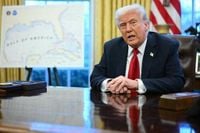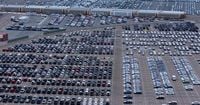President Donald Trump announced on March 26, 2025, that a 25% tariff will be levied on all imported cars and auto parts, effective April 3, 2025. This significant move is intended to bolster American auto manufacturing and is part of a broader strategy to reshape U.S. trade policies. The announcement has sent shockwaves through the automotive industry, raising concerns about increased consumer costs and potential job losses.
During a press conference at the White House, Trump stated, "What we're going to be doing is a 25% tariff for all cars that are not made in the United States." He emphasized that vehicles manufactured domestically would not be subject to these tariffs, aiming to encourage automakers to establish and expand their production facilities within the U.S. The tariffs will also apply to car parts, including engines and transmissions, with the latter set to take effect no later than May 3, 2025.
The complexity of the automotive supply chain makes it difficult to predict the immediate impact of these tariffs. Currently, about half of the vehicles sold in the U.S. are imports, and a significant portion of the parts used in American-made cars comes from abroad. For instance, a vehicle assembled in the U.S. may rely on parts manufactured in Canada or Mexico, which complicates the tariff application. Parts that comply with the United States-Mexico-Canada Agreement (USMCA) will be exempt from tariffs until a system is established to apply tariffs to non-U.S. parts.
Industry experts warn that these tariffs could lead to a sharp increase in vehicle prices, with estimates suggesting that the cost of producing vehicles in U.S. plants could rise by between $3,500 and $12,000 each. This is particularly concerning given that the average price of new vehicles has already been climbing due to inflation. The tariffs may ultimately result in fewer options for consumers as automakers adjust their production strategies to mitigate costs.
Shares of major automakers fell sharply following the announcement, with General Motors experiencing a nearly 7% drop and Ford and Stellantis both falling over 4% in after-hours trading. The market reaction reflects widespread apprehension about the potential economic fallout from the tariffs.
Shawn Fain, president of the United Auto Workers union, expressed support for the tariffs, stating, "We applaud the Trump administration for stepping up to end the free trade disaster that has devastated working class communities for decades." Fain believes that the tariffs could lead to more shifts for workers at U.S. plants, but he also acknowledged the immediate disruptions that could occur as the industry adjusts.
In response to Trump’s announcement, various countries, including Canada, Mexico, and members of the European Union, have begun to consider retaliatory measures. Canadian Prime Minister Mark Carney condemned the tariffs as a "direct attack" on Canadian workers, while European Commission President Ursula von der Leyen characterized the tariffs as "bad for businesses, worse for consumers." Carney stated that Canada would defend its workers and companies, indicating that the country might implement its own tariffs in retaliation.
As the automotive industry braces for the impact of these tariffs, analysts caution that the repercussions could extend beyond just higher prices. The tariffs could disrupt supply chains, leading to production slowdowns and job losses not only in the U.S. but also in Canada and Mexico, where a significant number of vehicles are manufactured. Automotive manufacturing represents about 5% of Mexico's economic activity and employs approximately one million people, while Canada’s automotive sector accounts for about 10% of its manufacturing output.
According to data from S&P Global Mobility, the U.S. exported nearly 1 million vehicles to Canada and Mexico in 2024, valued at approximately $19.5 billion. If these countries retaliate with their own tariffs on U.S.-built vehicles, it could further strain the U.S. automotive sector, which already faces challenges from rising costs and shifting consumer preferences.
Trump's administration has framed the tariffs as a necessary step to protect national security and revitalize American manufacturing. However, critics argue that the tariffs could have the opposite effect, harming the very workers and industries they are intended to support. Jennifer Safavian, president and CEO of Autos Drive America, stated, "The tariffs imposed today will make it more expensive to produce and sell cars in the United States, ultimately leading to higher prices, fewer options for consumers, and fewer manufacturing jobs in the U.S."
As the April 3 deadline approaches, the automotive industry is on edge, anticipating not only the immediate effects of the tariffs but also the potential for further trade conflicts. Trump's aggressive trade policies have already created uncertainty in the market, and the upcoming reciprocal tariffs announcement on April 2 is likely to exacerbate these tensions. The future of the U.S. automotive industry hangs in the balance as stakeholders navigate the complexities of this evolving trade landscape.
In conclusion, while the administration touts the tariffs as a means to strengthen the American auto industry, the reality may be far more complicated. The interconnected nature of the global automotive supply chain means that the tariffs could lead to unintended consequences, affecting consumers, workers, and manufacturers across North America.








